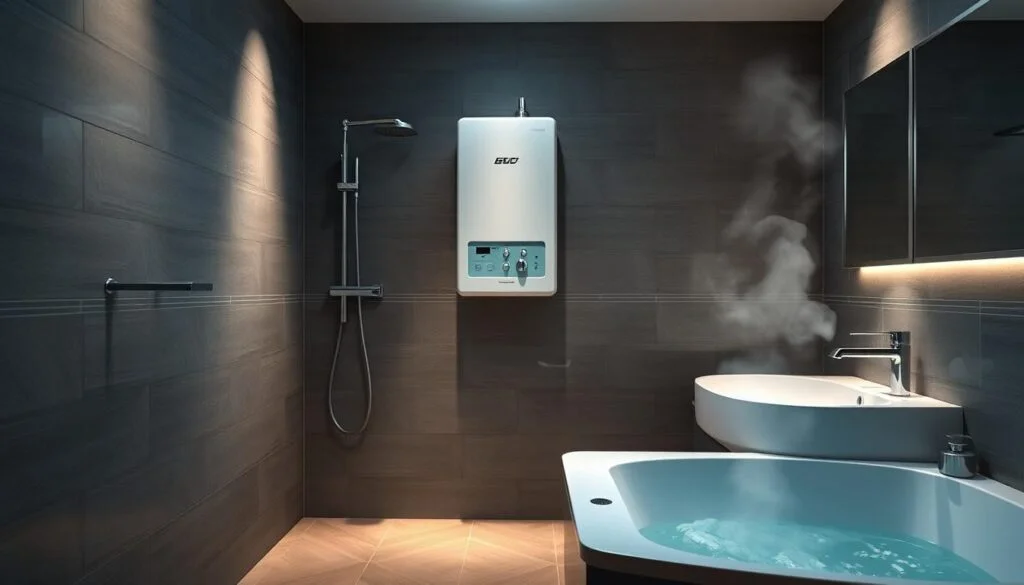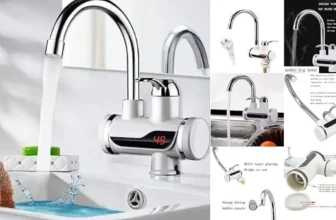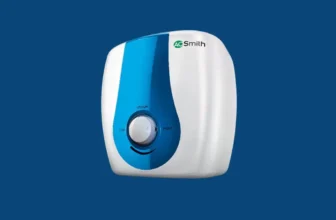Best Water Heater for Bathroom: Complete Buying Guide

Are you tired of cold showers or struggling to manage your home’s hot water needs? Choosing the right water heater for your bathroom can make all the difference in your daily comfort and energy efficiency. But with so many options on the market, how do you know which one is the best fit for your space and budget?
In this comprehensive guide, we’ll dive into the world of water heaters. We’ll explore the different types, key features, and sizing considerations to help you make an informed decision. Whether you’re seeking a tankless, electric, or gas-powered system, we’ve got you covered with expert insights and top-rated recommendations. Get ready to say goodbye to lukewarm water and hello to the perfect bathroom oasis.
Key Takeaways
- Understand the differences between tank and tankless, electric and gas-powered water heaters
- Determine the right size and capacity for your bathroom’s hot water needs
- Discover energy-efficient options that can save you money on utility bills
- Learn about installation requirements and maintenance tips for a long-lasting system
- Explore top water heater brands and models to find the perfect fit for your home
Understanding Water Heater Types for Your Bathroom
Choosing a water heater for your bathroom involves knowing the different types. There are tank and tankless water heaters, each with its own benefits and drawbacks. You can also choose between electricity or gas power. Plus, they can be set up for point-of-use or whole-house use.
Tank vs. Tankless Systems
Tank water heaters keep hot water in a tank for when you need it. They’re cheaper to buy but might cost more to run over time. Tankless water heaters heat water as you use it, saving energy and money in the long run.
Electric vs. Gas-Powered Options
Electric water heaters are simpler to install and keep up, but they cost more to run. Gas-powered water heaters save money on bills but need proper venting and are harder to install.
Point-of-Use vs. Whole-House Systems
Point-of-use water heaters serve just one bathroom or fixture, perfect for small homes or distant bathrooms. Whole-house water heaters heat water for the whole house, ideal for bigger homes with many bathrooms.
Understanding each water heater type’s unique features will help you pick the right one for your bathroom’s needs.
Key Features to Consider When Choosing a Water Heater for Bathroom
Choosing the right water heater for your bathroom is key. You want one that works well, is safe, and saves energy. Each feature is important for the best water heater for your bathroom.
Energy efficiency is a big deal. Opt for energy-efficient water heaters to cut down on bills and help the planet. Tankless or on-demand heaters are better at saving energy since they only heat water when you need it.
Being able to control the water temperature is also crucial. You want water that’s always just right. Look for heaters with advanced controls and digital displays to easily adjust the temperature.
- Energy efficiency: Choose energy-efficient water heaters to save money and help the environment.
- Temperature control: Find heaters that let you set the perfect water temperature for your comfort.
- Safety features: Make sure your heater has safety features like automatic shut-off to keep your family safe.
- Durability and longevity: Pick a heater that lasts long to avoid having to replace it often.
By focusing on these features, you can find the ideal water heater for your bathroom. It should be efficient, comfortable, and safe for everyone.
| Feature | Importance | Top Considerations |
|---|---|---|
| Energy Efficiency | High | Look for ENERGY STAR certified models, tankless or heat pump water heaters |
| Temperature Control | High | Digital controls, precision temperature settings, safety features |
| Safety | High | Automatic shut-off, overheat protection, leak detection |
| Durability | High | Reputable brand, quality construction, warranty coverage |
Size and Capacity Requirements for Different Bathroom Setups
Choosing the right water heater for your bathroom is important. The size and capacity matter a lot. They depend on how much hot water your household uses.
This usage can change based on several things. Like how many bathrooms you have, how many people live there, and how they use hot water.
Calculating Hot Water Demand
To find the right water heater size, you need to figure out your hot water needs. Think about a few things:
- Number of bathrooms and occupants
- How often and long people take showers or baths
- How much you use appliances like washing machines and dishwashers
- The temperature of the water you want
Space Considerations and Installation Requirements
Space and how to install the water heater are also key. Tankless water heaters are small and can be wall-mounted. They’re great for small bathrooms.
But, traditional tank-style water heaters need more space. They can hold more hot water, though.
Flow Rate and Recovery Time
Flow rate and recovery time are also important. Flow rate is how much hot water the heater can give at once. Recovery time is how long it takes to heat water again after it’s used.
Having the right flow rate and recovery time is crucial. It ensures you always have hot water when you need it.
Energy Efficiency Ratings and Cost Savings
When picking a water heater for your bathroom, focus on energy efficiency. An energy-efficient water heater cuts down on environmental harm and saves money on bills.
The Energy Factor (EF) rating shows how efficient a water heater is. It looks at heat loss, energy use, and how fast it heats water. A higher EF means better energy use. Aim for an EF of 0.67 or more for the best savings.
Also, check for the ENERGY STAR® label. This means the energy-efficient water heaters meet high energy standards. They use less energy and cost less to run than regular models.
- Energy Factor (EF) rating: Measures efficiency, with higher ratings saving more energy.
- ENERGY STAR® certification: Shows water heaters meet strict energy standards.
- Tankless water heaters: Often more efficient than tank-style models.
- Heat pump water heaters: Very efficient, using electricity to move heat, not make it.
Choosing an energy-efficient water heater for your bathroom lowers your energy bills and environmental impact. The initial cost might be higher, but the long-term savings are worth it.

“Choosing an energy-efficient water heater is not only good for the environment, but it can also save you hundreds of dollars on your utility bills over the lifetime of the unit.”
Installation Requirements and Considerations
Installing a new water heater for your bathroom involves several key factors. You need to think about venting, electrical needs, plumbing connections, and safety features. A proper and safe installation is vital for your water heater’s long-term performance and efficiency.
Venting and Electrical Requirements
The type of water heater you choose affects the installation. Gas-powered water heaters need to be vented outside to safely remove exhaust gases. Electric water heaters, however, require a dedicated electrical circuit and proper grounding.
Plumbing Connections and Safety Features
Connecting the water heater to your bathroom’s plumbing is crucial. You must ensure proper pipe sizing, secure the water supply lines, and install safety features. These include pressure relief valves and temperature-pressure relief valves to prevent issues.
Professional vs. DIY Installation
Homeowners can choose between hiring a professional plumber or doing it themselves. While DIY installation can save money, it’s important to consider your skills and comfort level. Professional installation is more expensive but ensures a safe and proper installation, along with any necessary permits and code compliance.
| Factors | Professional Installation | DIY Installation |
|---|---|---|
| Expertise | Experienced plumbers with proper training and knowledge | Requires DIY skills and understanding of the installation process |
| Safety | Ensures proper and safe installation, with attention to code compliance | Potential risks if not done correctly, such as water leaks or electrical issues |
| Time and Effort | Can complete the installation more efficiently | May require more time and effort for a DIY approach |
| Cost | Generally more expensive upfront | Can be more cost-effective, but risks of improper installation may lead to higher long-term costs |
Choosing between professional or DIY water heater installation requires careful consideration. It’s important to weigh the benefits and risks to ensure a safe and successful installation that meets your needs.
Top Brands and Models Comparison
Choosing the right water heater for your bathroom is key. The market has many options, from energy-saving tankless units to reliable storage tanks. Let’s look at some top choices and their best features to guide your decision.
Tankless Water Heaters for Bathrooms
Brands like Navien, Rinnai, and Rheem make great tankless water heaters for bathrooms. These systems give hot water on demand, so you never run out. Look for high energy factor ratings, compact designs, and good temperature control.
Traditional Storage Tank Water Heaters
If you like traditional storage tanks, AO Smith, Bradford White, and Whirlpool have good options. These models have more capacity for big households. Check for better insulation, self-cleaning, and smart tech for saving energy and easy monitoring.
| Brand | Model | Type | Capacity (Gallons) | Energy Factor (EF) | Avg. Customer Rating |
|---|---|---|---|---|---|
| Navien | NPE-180A | Tankless | N/A | 0.97 | 4.7/5 |
| Rinnai | V65iN | Tankless | N/A | 0.93 | 4.6/5 |
| AO Smith | GDHE-50 | Storage Tank | 50 | 0.67 | 4.5/5 |
| Bradford White | RG2PV50S6X | Storage Tank | 50 | 0.68 | 4.6/5 |
The best water heater for your bathroom depends on your needs. Think about your hot water needs, space, and what you prefer. Look at the features, energy efficiency, and reviews to choose wisely.
Maintenance Tips and Longevity Factors
Keeping your bathroom water heater in good shape is key. It helps it work well and last longer. By sticking to a maintenance plan and fixing problems fast, your water heater will stay efficient for many years.
Regular Maintenance Schedule
To keep your water heater running smoothly, follow these steps:
- Flush the tank every 6-12 months to remove sediment buildup
- Inspect the anode rod annually and replace it if necessary
- Check the temperature and pressure relief valve to ensure it’s functioning properly
- Clean the exterior of the water heater to prevent dust and debris accumulation
Common Problems and Solutions
Even with regular care, your water heater might face some issues. Here are common problems and how to fix them:
- Leaks – Check the tank, connections, and valves for any signs of leakage and address them promptly to prevent water damage.
- Inadequate hot water – Inspect the heating element or burner, and consider adjusting the temperature setting or replacing the thermostat if necessary.
- Loud noises – Flushing the tank to remove sediment buildup can often resolve issues with rumbling or popping sounds.
Extending Your Water Heater’s Lifespan
By following the recommended maintenance practices and addressing issues quickly, you can maximize the longevity of your water heater. Additionally, consider these tips to extend its lifespan:
- Insulate the tank and pipes to improve energy efficiency and reduce heat loss
- Upgrade to a more energy-efficient model when it’s time to replace your water heater
- Regularly inspect the unit for any signs of corrosion or deterioration
By focusing on water heater maintenance and fixing water heater repair issues fast, you can make sure your bathroom water heater keeps providing hot water for years.
Price Range and Value Analysis
Replacing your bathroom water heater can cost a lot, depending on the type. Knowing the prices and long-term savings of different options helps you choose wisely. This ensures you get the best deal for your budget and needs.
Tank-style water heaters are usually cheaper upfront, costing between $400 and $1,200. But, tankless water heaters, which cost $800 to $1,500, might save you money in the long run. They use less energy, which can make up for the higher initial cost.
| Water Heater Type | Typical Price Range | Estimated Annual Energy Costs | Estimated Lifespan |
|---|---|---|---|
| Tank-style Electric | $400 – $800 | $300 – $500 | 8 – 12 years |
| Tank-style Gas | $500 – $1,200 | $200 – $400 | 8 – 12 years |
| Tankless Electric | $800 – $1,500 | $100 – $300 | 15 – 20 years |
| Tankless Gas | $900 – $1,800 | $150 – $400 | 15 – 20 years |
When looking at water heater value, think about more than just the cost. Consider the long-term expenses and energy use. Tankless water heaters, for example, cost more upfront but can save you money on bills. They’re a good choice for homes that use a lot of hot water.
The right water heater replacement for your bathroom depends on your needs, budget, and goals. By looking at all the factors, you can find the best option that balances cost and value.

Conclusion
Choosing the right water heater for your bathroom is important. You need to think about what you need, how much you can spend, and what you want in the long run. Whether you like traditional tank-style or tankless systems, consider size, capacity, energy use, and installation needs.
Knowing about different water heaters, their features, and brands helps you make a smart choice. This way, you can find a heater that meets your hot water needs and fits your budget and values. A good water heater can last for years and save you money on bills.
The best water heater for your bathroom depends on your specific situation. Take time to figure out what you need, look at different options, and get help from experts if needed. With this guide, you’re ready to find the perfect water heater for bathroom for your home and life.
FAQ
What are the different types of water heaters suitable for bathrooms?
There are two main types for bathrooms: tank and tankless water heaters. They can run on electricity or natural gas. You can also choose between point-of-use and whole-house systems.
What are the key features to look for in a water heater for the bathroom?
Look for energy efficiency and precise temperature control. Safety features, durability, and meeting your hot water needs are also key. Consider size, capacity, and installation needs too.
How do I determine the right size and capacity for my bathroom water heater?
First, calculate your household’s hot water demand. Consider the number of bathrooms, household size, and usage. Make sure the water heater fits in your space and meets flow and recovery needs.
What are the main energy efficiency ratings to look for in a water heater?
The Energy Factor (EF) rating shows a water heater’s energy efficiency. Look for ENERGY STAR-certified models for better savings. These ratings help you choose an eco-friendly, cost-effective option.
What are the installation requirements for a bathroom water heater?
Installation varies by water heater type. You’ll need to consider venting, electrical wiring, plumbing, and safety. Ensure your home meets these needs, and consider hiring a professional for the job.
How can I properly maintain my bathroom water heater?
Regular maintenance is key to a long water heater life. Flush the tank, check the anode rod, and inspect the pressure relief valve. Fixing issues quickly can also help extend its life.
What is the typical price range for a bathroom water heater?
Prices vary widely, from $400 for a basic electric tank model to over $1,000 for a high-efficiency tankless system. The type, size, brand, and installation requirements all affect the cost.
Read More:-
Top Rated Instant Water Heater Reviews & Guide 2024
Bajaj Water Heater: Top-rated models, reviews, and buying guide for your home






